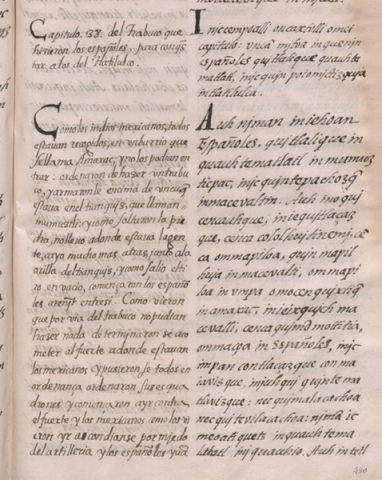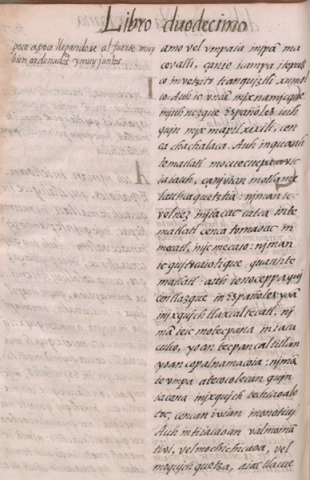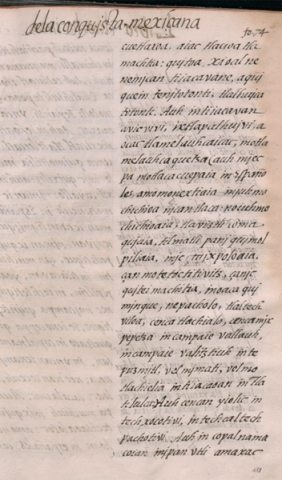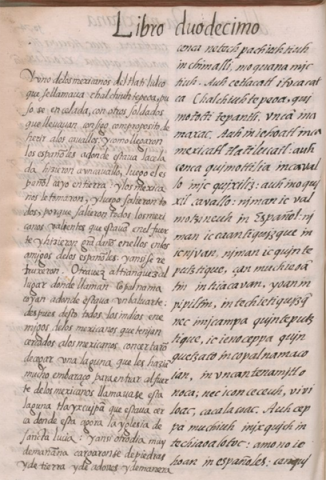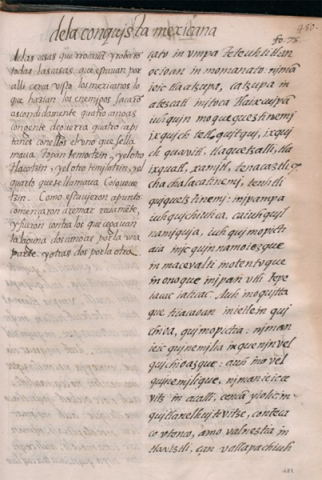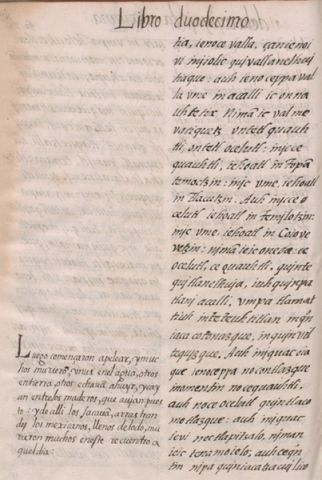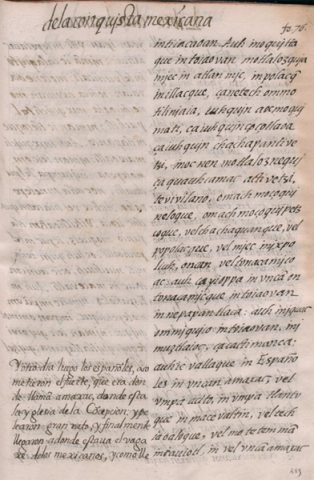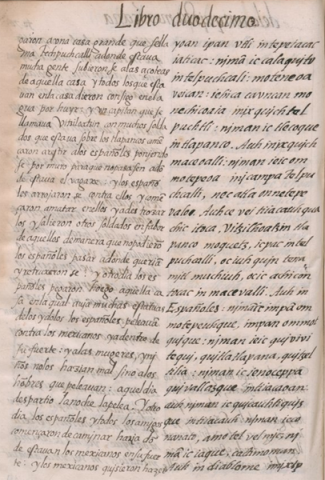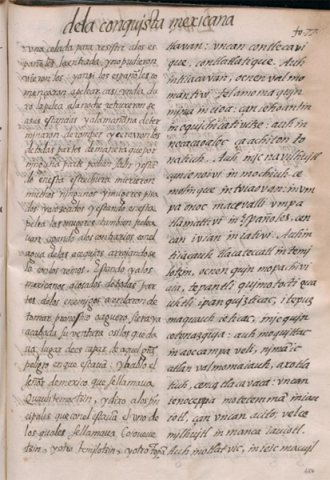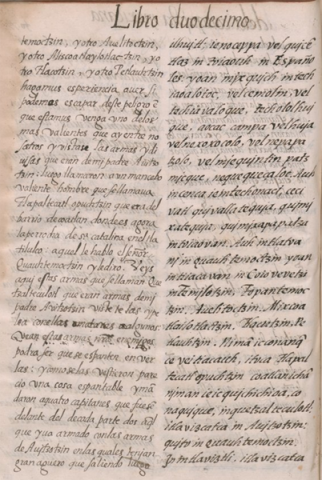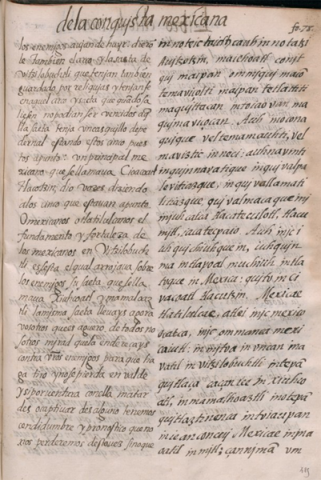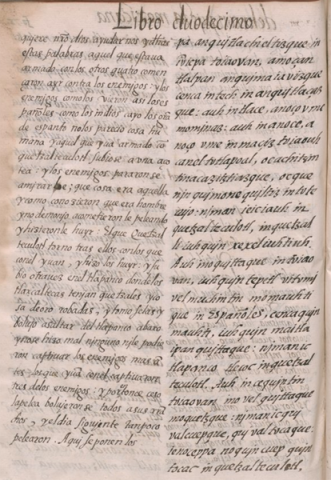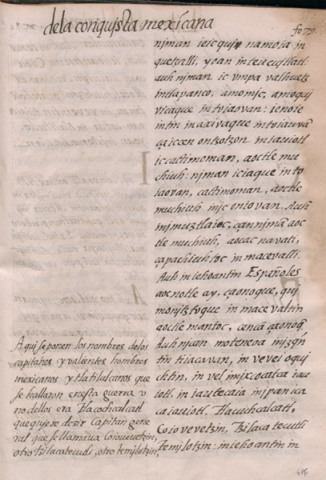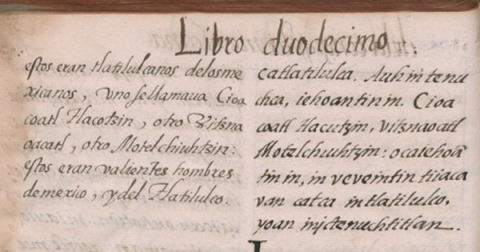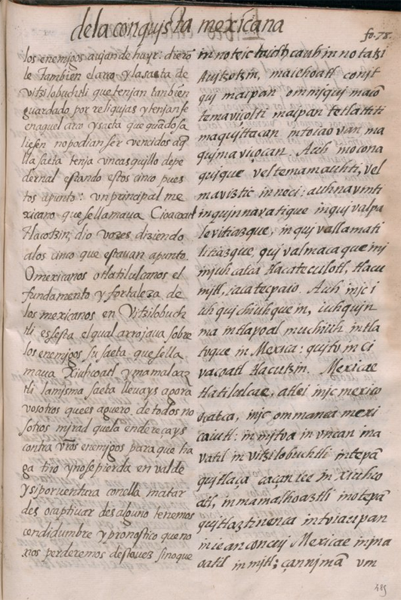 |
[Transcription of the Nahuatl (right-hand column) by James Lockhart:]
[f. 78r.] in noteichiuhcauh* in notatzi Auitzotzin, ma iehoatl conitqui ma ipan ommiqui ma cōtemaviçolti ma ipan tetlattiti ma quittacan in toiaovan ma quimaviçocan. Auh in oconaquique vel temamauhti, vel maviztic in neci: auh navinti in quinnavatique in quivalpalevitiazque, in quivallamatilitiazque, quivalmacaque in imiuh catca tlacateculotl, tlacumitl, iacatecpaio. Auh inic iuh quichiuhque in, iuhquin ma intlapoal muchiuh in tlatoque in Mexica:
quito in Civacoatl Tlacutzin. Mexicae tlatilulcae, atlei inic mexico ocatca, inic ommanca mexicaiutl: in mitoa in vncan inavatil in vitzilobuchtli in tep quitlaça ca çan iee in xiuhcoatl, in mamalhoaztli in otepā quitlaztinenca in toiaupan in ie anconcui Mexicae in inaoatil in mitl: çan nimā vm
----------
*NOTEICHIUHCAUH. This form, in which the first is i is erroneous, is partially corrected from an earlier error.
|
[Translation of the Nahuatl (right-hand column) by James Lockhart:]
of my progenitor, my father Ahuitzotl. Let him wear it, let him die in it. Let him dazzle people with it, let him show them something; let our enemies see and admire it.” When they put it on him he looked very frightening and splendid. And they ordered four [others] to come helping him, to accompany him. They gave him the darts of the devil, darts of wooden rods with flint tips. And the reason they did this was that it was as though the fate of the rulers of the Mexica was being determined.
The Cihuacoatl Tlacotzin said, “Oh Mexica, oh Tlatelolca, is there nothing left of the way it was in Mexico, of the way the Mexican state was, which was said to be the envoy of Huitzilopochtli that he sends against people, as he used to send the fire serpent, the fire drill at our enemies? Oh Mexica, you are taking his envoy the dart;
[Translation of the Spanish (left-hand column) by James Lockhart:]
the enemy would flee. They also gave him the bow and arrow of Huitzilopochtli, which they had also kept as relics, and they had faith that when that bow and arrow were brought out, they could not be defeated. That arrow had a head of flint.
When these five were all ready, a Mexica leader called Cihuacoatl Tlacotzin called out, saying to the five who were ready, "O Mexica, O Tlatelolca, the foundation and strength of the Mexica through Huitzilopochdi is that he cast at the enemy his arrow, called xiuhcoatl and mamalhuaztli. Now you bear the same arrow, which is the omen for all of us. See that you aim it against your enemies so that it hits and does not miss. If perhaps you kill or capture someone with it, we will have a certain sign that we will not be lost this time, but
|
[Translation of the Nahuatl into Spanish by Fr. Bernardino de Sahagún; transcription of the Spanish (left-hand column) by James Lockhart:]
[f. 78r.] los enemigos auian de huyr: dierōle Tambien el arco y la saeta de vitzilobuchtli que tenian tanbien guardado por reliquias y tenian fe en aquel arco y saeta que quādo saliesen no podian ser vencidos aq̄lla saeta tenia vn casquillo de pedernal
estando estos cinco puestos a punto: vn principal mexicano que se llamaua Cioacoatl Tlacotzin, dio vozes diziendo a los cinco que estauan a punto O mexicanos o tlatilulcanos el fundamento y fortaleza de los mexicanos en Vitzilobuchtli ess esta* el qual arrojaua sobre los enemigos su saeta que se llamaua Xiuhcoatl y mamaloaztli la misma saeta lleuays agora vosotros que es aguero de todos nosotros mirad que la endereçays contra v̄r̄os enemigos para que haga tiro y no se pierda en valde y si por uentura con ella matardes o captiuardes alguno tenemos cendidumbre** y pronostico que no nos perderemos desta uez sino que
----------
*ESS ESTA. Apparently for "es esto."
**CENDIDUMBRE. For "certidumbre."
|
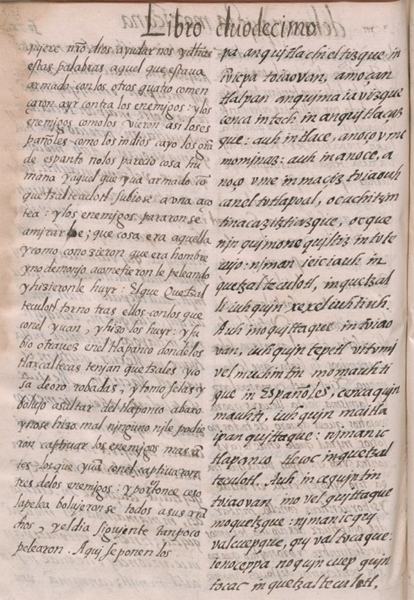 |
[Transcription of the Nahuatl (right-hand column) by James Lockhart:]
[f. 78v.] pa anquitlachieltizque in īvicpa toiaovan, amo çan tlalpan anquimaiavizque cenca intech in anquitlaçazque: auh intla ce, anoço vme mominaz: auh in ano ce, anoço vme in maçiz toiaouh ca nel totlapoal, oc achitzin tinacazitztiazque, oc quenin quimonequiltiz in totecuio:* niman ie ic iauh in quetzalteculotl, in quetzalli iuhquin xexeliuhtiuh.
Auh in oquittaque in toiaovan, iuhquin tepetl vitomi vel muchintin momauhtique in Españoles, cenca quinmauhti, iuhquin ma itla ipan quittaque: niman ic tlapanco tlecoc in quetzalteculotl. Auh in cequintin toiaovan in o vel quittaque moquetzque: niman ic quivalcuepque, quivaltocaque: ie no ceppa no quincuep quintocac in quetzalteculotl,
----------
*TOTECUIO. Several elements in the translation of the preceding speech are more than normally speculative.
|
[Translation of the Nahuatl (right-hand column) by James Lockhart:]
you are to aim it only at our enemies. You are not just to cast it on the ground, but hurl it very close to them. And if one or two of them are hit, or if one or two of our enemies are captured, then it is truly our fate that for a little while longer we will <find favor>, while our lord so wishes.” Then the quetzal-owl went, with the quetzal feathers waving.
When our enemies saw him, it was as though a mountain had fallen. Every one of the Spaniards was frightened, he intimidated them, they seemed to respect him a great deal. Then the quetzal-owl climbed up on the roof. But when some of our enemies had taken a good look at him they rose and turned him back, pursuing him. Then the quetzal-owl turned them again and pursued them.
[Translation of the Spanish (left-hand column) by James Lockhart:]
that our god wants to help us." After these words were said, the one who wore the insignia, together with the other four, began to go against the foe.
When the enemies, Spaniards as well as Indians, saw them, great fright possessed them; it did not seem human to them. The one wearing the quetzaltecolotl device climbed up on a roof terrace. The enemies stopped to look at him and see what manner of thing it was; when they recognized that it was a man and not a demon, they attacked him, giving battle, and made him flee. The one with the quetzaltecolotl turned against them, with those who accompanied him, and made them flee. He climbed on the tlapanco again, where the Tlaxcalans had quetzales and items of gold that they had stolen, and he took them and leaped down from the tlapanco again. He received no harm whatever, nor could the enemies capture him; rather, those who accompanied him captured three of the enemy. For the time being the battle ceased, and they all returned to their huts.
The following day they did not fight either.
Here are given the
|
[Translation of the Nahuatl into Spanish by Fr. Bernardino de Sahagún; transcription of the Spanish (left-hand column) by James Lockhart:]
[f. 78v.] quiere n̄r̄o dios ayudarnos y đħas estas palabras aquel que estaua armado con los otros quatro començaron a yr contra los enemigos:
y los enemigos como los vieron asi los españoles como los indios cayolos grāde espanto no los parecio cosa humana y aquel que yua armado cō quetzalteculotl subiose a vna açotea: y los enemigos pararonse a mirarle; que cosa era aquella y como conozieron que era hombre y no demonio acometieronle peleando y hizieronle huyr: El Quetzalteculotl* torno tras ellos con los que con el yuan, y hizolos huyr: y subio otra uez en el tlapanco donde los tlaxcaltecas tenian quetzales y cosa de oro robadas, y tomoselas y boluio a saltar del tlapanco abaxo y no se hizo mal ninguno ni le podieron captiuar los enemigos mas ātes los que yuā con el capituaron tres de los enemigos: y por entonce ceso la pelea boluieronse todos a sus rrāchos,
y el dia siguiente Tanpoco pelearon.
Aqui se ponen los**
----------
*QUETZALTECULOTL. In the manuscript, through inadvertence the que of this word was written twice.
**AQUI SE PONEN LOS. In the manuscript, these words are inadvertently repeated at the beginning of fol. 79.
|
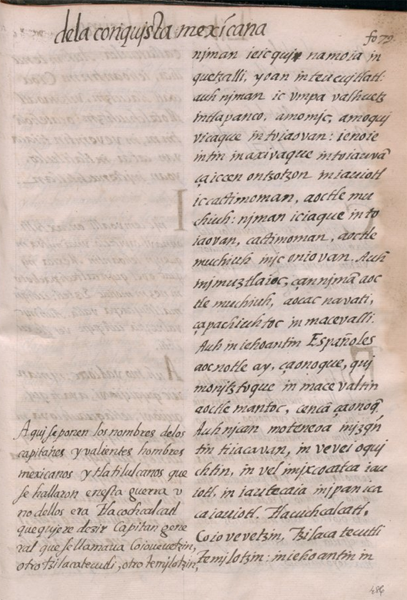 |
[Transcription of the Nahuatl (right-hand column) by James Lockhart:]
[f. 79r.] niman ie ic quinamoia in quetzalli, yoan in teucuitlatl: auh niman ic vmpa valhuetz in tlapanco, amo mic, amo quivicaque in toiaovan: ie no ieintin in axivaque in toiauvā ça ic cen ontzotzon in iauiotl* ic cactimoman, aoctle muchiuh: niman ic iaque in toiaovan, cactimoman, aoctle muchiuh inic oniovan.
Auh in imuztlaioc, çan nimā aoctle muchiuh, aocac navati, ça pachiuhtoc in macevalli. Auh in iehoantin Españoles aoc no tle ay, ça onoque, quimonitztoque in macevaltin aoctle mantoc, cencā ça onoq̄.
Auh nican moteneoa in izq̄ntin tiiacavan, in vevei oquichtin, in vel imixco catca iauiotl, in iautecaia in ipan icaca iauiotl. Tlacuchcalcatl, Coiovevetzin, Tzilacatecutli Temilotzin: in iehoantin in
----------
*IAUIOTL. This term could be interpreted as meaning the individual battle, but the fact that there was no more serious fighting, and the use of the phrase ic cen 'for good, once and for all, entirely' lead one to think that the whole war is meant.
|
[Translation of the Nahuatl (right-hand column) by James Lockhart:]
Then he snatched up the precious feathers and gold and dropped down off the roof. He did not die, and our enemies did not carry him off. Also three of our enemies were captured. At that the war stopped for good. There was silence, nothing more happened. Then our enemies went away. It was silent and nothing more happened until it got dark.
And the next day nothing more happened at all, no one made a sound. The common people just lay collapsed. The Spaniards did nothing more either, but lay still, looking at the people. Nothing was going on, they just lay still.
Here are mentioned all the warriors, the men of great valor, in whose countenances was war, who directed the battle and presided over it: the Tlacochcalcatl Coyohuehuetzin and the lord of Tzilacan, Temilotzin—these
[Translation of the Spanish (left-hand column) by James Lockhart:]
names of the captains and brave men, Mexica and Tlatelolca, who took part in this war. One of them was the Tlacochcalcatl, which means captain-general, called Coyohuehuetzin; another Tzilacateuctli, another Temilotzin;
|
[Translation of the Nahuatl into Spanish by Fr. Bernardino de Sahagún; transcription of the Spanish (left-hand column) by James Lockhart:]
[f. 79r.] nombres de los capitanes y valientes hombres exicanos y tlatilulcanos que se hallaron en esta guerra vno dellos era Tlacochcalcatl que quiere dezir Capitan general que se llamaua Coioueuetzin, otro Tzilacatecutli, otro Temilotzin,
|
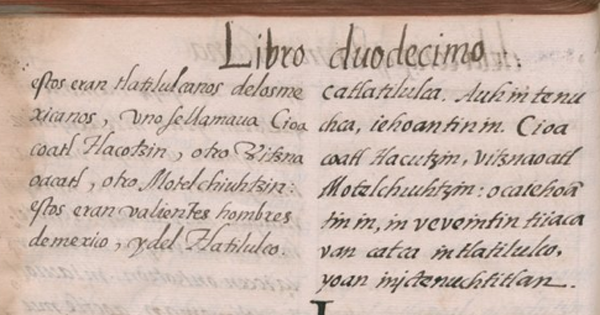 |
[Transcription of the Nahuatl (right-hand column) by James Lockhart:]
[f. 79v.] ca tlatilulca. Auh in tenuchca, iehoantin in. Cioacoatl tla cutzin, vitznaoatl Motelchiuhtzin: o ca iehoātin in, in veveintin tiiacavan catca in tlatilulco, yoan inic tenuchtitlan.
|
[Translation of the Nahuatl (right-hand column) by James Lockhart:]
are Tlatilolca. And these are Tenochca: the Cihuacoatl Tlacotzin and the Huitznahuatl Motelchiuhtzin. These were the great warriors of Tlatelolco and Tenochtitlan.
[Translation of the Spanish (left-hand column) by James Lockhart:]
these were Tlatelolca. Of the Mexica, one was called Cihuacoatl Tlacotzin, another Huitznahuacatl, another Motelchiuhtzin. They were brave men of Mexico and of Tlatelolco.
|
[Translation of the Nahuatl into Spanish by Fr. Bernardino de Sahagún; transcription of the Spanish (left-hand column) by James Lockhart:]
[f. 79v.] estos eran tlatilulcanos de los mexicanos, vno se llamaua Cioacoatl Tlacotzin, otro Vitznaoacatl, otro Motelchiuhtzin: estos eran valientes hombres de mexico, y del Tlatilulco.
|
